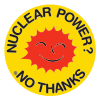
| Anti-nuclear movement |
|---|
 |
| By country |
| Lists |
The application of nuclear technology, both as a source of energy and as an instrument of war, has been controversial.[1][2][3][4][5]
Scientists and diplomats have debated nuclear weapons policy since before the atomic bombing of Hiroshima in 1945.[6] The public became concerned about nuclear weapons testing from about 1954, following extensive nuclear testing in the Pacific. In 1961, at the height of the Cold War, about 50,000 women brought together by Women Strike for Peace marched in 60 cities in the United States to demonstrate against nuclear weapons.[7][8] In 1963, many countries ratified the Partial Test Ban Treaty which prohibited atmospheric nuclear testing.[9]
Some local opposition to nuclear power emerged in the early 1960s,[10] and in the late 1960s some members of the scientific community began to express their concerns.[11] In the early 1970s, there were large protests about a proposed nuclear power plant in Wyhl, Germany. The project was cancelled in 1975 and anti-nuclear success at Wyhl inspired opposition to nuclear power in other parts of Europe and North America.[12][13] Nuclear power became an issue of major public protest in the 1970s.[14]
- ^ "Sunday Dialogue: Nuclear Energy, Pro and Con". New York Times. February 25, 2012.
- ^ Robert Benford. The Anti-nuclear Movement (book review) American Journal of Sociology, Vol. 89, No. 6, (May 1984), pp. 1456-1458.
- ^ James J. MacKenzie. Review of The Nuclear Power Controversy by Arthur W. Murphy The Quarterly Review of Biology, Vol. 52, No. 4 (Dec., 1977), pp. 467-468.
- ^ Cite error: The named reference
elevenwas invoked but never defined (see the help page). - ^ Jim Falk (1982). Global Fission: The Battle Over Nuclear Power, Oxford University Press.
- ^ Cite error: The named reference
browwas invoked but never defined (see the help page). - ^ Woo, Elaine (January 30, 2011). "Dagmar Wilson dies at 94; organizer of women's disarmament protesters". Los Angeles Times.
- ^ Hevesi, Dennis (January 23, 2011). "Dagmar Wilson, Anti-Nuclear Leader, Dies at 94". The New York Times.
- ^ Cite error: The named reference
rudig2was invoked but never defined (see the help page). - ^ Paula Garb. Review of Critical Masses, Journal of Political Ecology, Vol 6, 1999.
- ^ Cite error: The named reference
rudigwas invoked but never defined (see the help page). - ^ Cite error: The named reference
pubwas invoked but never defined (see the help page). - ^ Cite error: The named reference
gotwas invoked but never defined (see the help page). - ^ Jim Falk (1982). Global Fission: The Battle Over Nuclear Power, Oxford University Press, pp. 95-96.
© MMXXIII Rich X Search. We shall prevail. All rights reserved. Rich X Search
